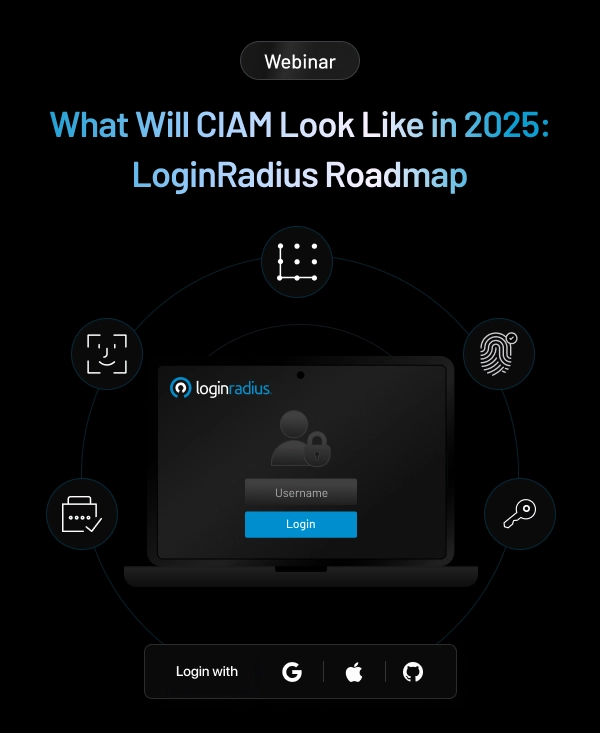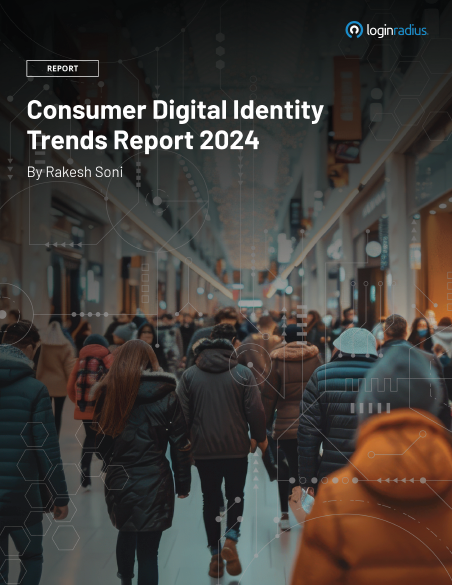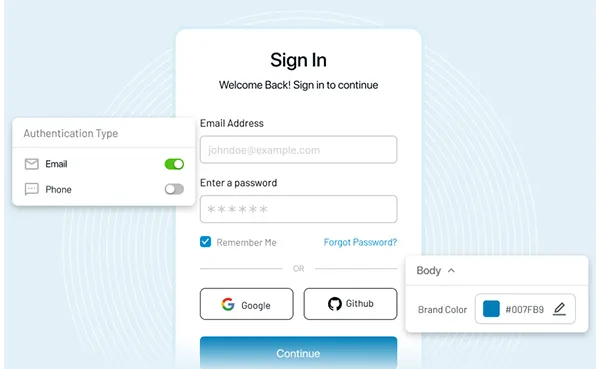Introduction
Today, there are close to three billion active users on Facebook. Gmail has over 1.8 billion active users. Close to half a billion people use Instagram every day.
Given the rising popularity of social media, many apps and websites now offer the option to sign in using social credentials instead of a traditional registration.
Social login is faster and more convenient and eliminates problems like login friction and password fatigue. This article explores ten things you need to know about allowing users to log in with their social media profiles.
What is Social Login?
Social login, also known as social sign-on or sign-in, is a method of authentication that allows users to access websites or applications using their existing social media credentials. Rather than creating a new account with a separate username and password, users can simply click on a social media button, such as Facebook, Google, or Twitter, to log in.
This process leverages the authentication services provided by these social platforms, acting as a bridge between the user's social media account and the website they wish to access.
How Does Social Login Work?
When a user chooses to log in using their social media account, the website or application redirects them to the respective social media platform's authentication page. Here, the user is asked to grant permission for the website to access certain information from their social media profile, such as their name, email address, profile picture, and sometimes additional data like their friend list or interests.
Once the user grants permission, the social platform verifies their identity and sends back a token to the website or application. This token serves as proof of authentication, confirming that the user is who they claim to be. The website then uses this token to create a new account for the user or log them into an existing account associated with their social media profile. This entire process is seamless to the user, requiring minimal effort and eliminating the need to remember yet another set of login credentials.
Reasons Why You Should Implement Social Login
1. Enhanced User Experience
Social login offers a streamlined and user-friendly experience for your visitors. It eliminates the need for users to create yet another account with a new set of credentials, reducing friction during the sign-up process. With just a few clicks, users can access your platform using information they are already familiar with, such as their Facebook or Google account.
2. Faster Registration and Login
The convenience of social login translates to faster registration and login times. Users are more likely to complete the sign-up process if it is quick and effortless, leading to increased conversion rates. This is particularly beneficial for mobile users who value speed and simplicity.
3. Accurate User Data
By implementing social login, businesses can access a wealth of user data from social media profiles. This includes demographic information, interests, and social connections. This data allows for more personalized user experiences, targeted marketing campaigns, and better insights into user behavior.
4. Reduced Password Fatigue
With the prevalence of numerous online accounts, users often struggle to remember multiple passwords. Social login eliminates this issue by removing the need for users to create and manage yet another password. This reduces the likelihood of forgotten passwords and the need for password resets.
5. Increased Security
Contrary to common belief, social login can enhance security for both users and businesses. Social media platforms invest heavily in security measures to protect user accounts. By leveraging these platforms for authentication, businesses can benefit from the robust security protocols implemented by companies like Facebook, Google, and Twitter.
6. Mobile Optimization
With the majority of internet users accessing content via mobile devices, optimizing your platform for mobile is crucial. Social login aligns with mobile usage patterns, providing a seamless experience for users on smartphones and tablets. This can lead to higher mobile conversion rates and improved user engagement.
7. Reduced Cart Abandonment
In e-commerce scenarios, social login can significantly reduce cart abandonment rates. By simplifying the checkout process and eliminating the need for lengthy registration forms, users are more likely to complete their purchases. This translates to increased revenue for businesses.
8. Simplified Customer Support
By utilizing social login, businesses can reduce the number of support requests related to forgotten passwords or account access. Users are less likely to encounter login issues, freeing up customer support resources to focus on more critical tasks.
What is Social Media Login?
Social media login, also known as social sign-on or sign-in, is a type of account authentication that allows users to enter an app or site without creating an account. Instead, social login uses information from social media networks to facilitate logins. It means trusting third-party apps – usually social platforms, to act as an identity provider.
The idea behind this Single Sign-On (SSO) variation is to remove the need to remember countless usernames and passwords when only one can suffice. This convenient alternative to mandatory account creation results in users' simplified sign-in and registration experience.
- For users, social login is an effortless method of accessing sites and apps as there is no need to fill out a registration form or remember different passwords.
- For businesses, social login streamlines the user verification process while also allowing marketers to gather more accurate customer data.
The Evolution of Social Login
Social login has transformed significantly since its inception, evolving from a simple convenience feature to a multifaceted tool with profound implications for user engagement, marketing strategies, and security measures.
Initially, social login emerged as a solution to the hassle of registering for multiple websites and applications. Users embraced the convenience of logging in with their existing social media credentials, simplifying the authentication process and driving higher engagement rates for businesses.
As its popularity grew, social login became a valuable asset for marketers. By leveraging user data from social media profiles, businesses gained insights into demographics, interests, and social connections. This enabled them to personalize marketing efforts, target specific audiences, and enhance the overall user experience.
However, concerns about security and privacy emerged alongside the benefits of social login. To address these issues, advanced authentication protocols and encryption techniques were developed to protect user data and mitigate the risk of data breaches.
In recent years, social login has expanded to encompass omnichannel experiences, offering a seamless login process across various platforms and devices. Looking ahead, social login is poised to continue shaping the landscape of customer identity management, driving engagement, personalization, and security in the digital age.
Addressing Common Social Login Challenges
Despite its benefits, social login comes with its fair share of challenges. Here's how businesses can address some common issues:
1. Security Concerns
Security remains a top priority when implementing social login. To mitigate risks, businesses should invest in robust authentication protocols, encryption methods, and regular security audits. Additionally, providing users with transparency regarding data usage and implementing measures such as two-factor authentication can enhance security.
2. User Privacy
Users are increasingly concerned about the privacy implications of social login. Businesses should be transparent about data collection practices, obtain explicit consent from users, and adhere to privacy regulations such as GDPR and CCPA. Offering users control over their data through privacy settings and clear opt-out options can also build trust.
3. Integration Challenges
Integrating social login into existing systems can be complex, especially for businesses with diverse platforms and technologies. Adopting standardized authentication protocols like OAuth can streamline integration efforts. Additionally, leveraging identity management platforms or software development kits (SDKs) can simplify the implementation process and ensure compatibility across platforms.
4. User Experience
While social login offers convenience, a poor user experience can deter users. Businesses should optimize the social login process for simplicity and accessibility, minimizing the number of clicks and providing clear instructions. Offering alternatives such as guest checkout or traditional registration can cater to users who prefer different authentication methods.
5. Data Accuracy and Quality
Although social login provides access to user data, ensuring its accuracy and quality can be challenging. Businesses should implement data validation processes to verify user-provided information and deduplicate user profiles. Leveraging data enrichment services or integrating with customer relationship management (CRM) systems can further enhance data quality and usability.
By addressing these challenges proactively, businesses can maximize the benefits of social login while mitigating risks and ensuring a positive user experience.
Advantages of Social Login
Below we highlight some advantages to consider about allowing users to log in with their social media profiles.
1. Easy and Quick Sign-In
As mentioned previously, the main benefit of social login is that it makes logging onto a website convenient, easy, and quick. Creating new accounts and filling out registration forms may be frustrating and time-consuming when users visit a different website.
The details of social media accounts are easier to remember since most are used daily, and surveys show that users are also happy to use them to sign into a website.
2. Quality User Data
An alarming number of users input incorrect or false information while filling out a registration form manually. When businesses use traditional registration processes, they rely solely on the data obtained from their records.
They frequently run into false names or email addresses that are no longer in use.
In addition, asking users to fill out a lengthy registration form with more than five data points may result in frustration or, in many cases, abandonment of the sign-up process altogether.
On the other hand, when users sign up via a social account, businesses typically access a larger amount of data points. They have an additional layer of verification of the user's information.
3. Eliminates Mistargeted Marketing
People get annoyed when websites show content not relevant to their interests.
Social login allows companies to access more accurate customer data, which they can utilize to curate personalized content.
When users sign up via social login, information like gender, age, interests, relationship status, and more are readily available. Personalized content creates a better user experience and makes your marketing campaigns more effective.
4. Irradicates Password Fatigue
Password fatigue makes it hard for people to remember the passwords that they created earlier. Most users would exit a website instead of trying to reset their account if they have trouble logging in or don't recall their login details.
Integrating social sign-in into your website avoids the need to remember passwords; therefore, the possibility of login failure or password resets becomes dramatically lower.
5. Increases Mobile Sign Ups
Over 90% of the global population uses some type of mobile device to browse the internet. Undoubtedly, mobile internet is here to stay with us for the long haul.
Therefore, you can't overlook the importance of having an optimized website, particularly a mobile-friendly login system. Using a social login means you are meeting mobile users' demands, thus expanding your market reach and realizing more mobile conversions.
6. Reduces Cart Abandonment
Forcing users to register and create accounts to add items to a virtual shopping cart will only make you lose sales. This additional step interrupts the purchase cycle and represents a huge barrier to a successful conversion.
A social login option reduces cart abandonment and creates a user-friendly and hassle-free checkout experience.
7. Increases Revenue
Lower cart abandonment results in higher conversion rates meaning more revenue for the company. Aside from cart abandonment, integrating social login also decreases the frequency of users needing to contact customer service, account resets for failed logins, or troubleshoot security issues.
Altogether, social login automation doesn't only mean a smoother experience on the customer side, but also, your staff will spend less time helping customers and more time on higher-value tasks.
8. Not A Foolproof Solution
In the end, despite the convenience of social media login - it is not a foolproof solution as it leaves room for security vulnerabilities. Username and password security are often breached and compromised by weak and reused passwords.
Moreover, if any social media website experiences data leaks or data thefts, users who have repeatedly used the same credentials are jeopardized on every app or site login linked to that account.
9. Complex Customer Journey
Despite having a simplified username and password, the rest of the customer journey can still be complicated. For example, the customer must input other data, like payment and billing information, during checkout.
10. Multiple Sign Ups
Adding social login options can sometimes lead to confusion. Instead of remembering login information, users now have to remember which social site they used to log into another website.
This can lead to the creation of multiple accounts by the same person and potentially create more frustration.
In Conclusion
In summary, social logins are the next wave of innovation in customer identity management, and businesses simply can't afford to ignore them. By allowing customers to use their social media profiles to identify themselves, businesses can bring a new level of convenience to the sign-up process, as well as gain access to vital customer data.
FAQs
1. What is social media login?
Social media login allows users to sign in to websites using their existing social media credentials, streamlining the authentication process.
2. What is customer social login?
Customer social login enables users to access services or websites using their social media accounts, enhancing convenience and user experience.
3. How do I enable social login?
You can enable social login by integrating OAuth or other authentication protocols into your website or app, allowing users to authenticate with their social media accounts.
4. What is a social account?
A social account refers to an individual's profile or account on a social media platform such as Facebook, Twitter, or Google.
5. Is social login free?
Yes, social login is typically free for both businesses and users, although there may be costs associated with implementing and maintaining the integration.

















